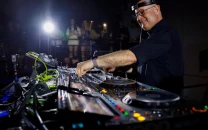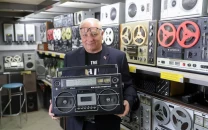Indian fans touch our feet but people here call us 'kafir' and listen to Indian songs: Faraz Anwar
Even after 25 years, ace guitarist is discriminated against for being a musician despite his numerous contributions.
1637048239-0/Faraz-(option-2)1637048239-0-640x480.webp)
When music falls on deaf ears, the rage and rumble of an otherwise silenced musician becomes noise from a wired gearbox. The sirens of a call to action are conveniently passed on and peace is above any cause that wouldn’t benefit us directly. The ringing of our cellphones is distraction enough.
But God forbid, we need comforting, and a Cold Play track can serve as the balm on our bruises. Another Brick in the Wall may also be an option if we’re old-timers, encountering a form of injustice. But as the uninterrupted streaming of our favourite songs keeps us from having to deal with the loneliness of deafening silence, we take the source offering us these cathartic experiences for granted.
For most artists hailing from Pakistan, lack of recognition isn’t even the biggest problem. Cultural taboos and lack of funding are recurrent themes shaping the fate of musicians in our country. Such is the case with Faraz Anwar, who was recently called out for ‘maligning Pakistan’s image’ after making ‘noise’ about a ‘non-issue’ that involved him being refused a place on rent on the basis of his profession.
“We are all worshippers of a rising sun and such hypocrites, that we give Pride of Performance awards to a few artists and deem others ‘kafir’. We are willing to profit off of a brand manufacturing alcohol but are offended when a musician tries to make money from his music,” Anwar lamented in a conversation with The Express Tribune.
“I’ve come to realise that people fail to understand how artists function. To this day, they think music can only be a side business and all of us are coming from affluent backgrounds,” Faraz had shared in an earlier interview. Now, he is convinced that musicians are not only misunderstood but also discriminated against. “I planned on setting up a studio in 2005 with a singer friend of mine. We couldn’t lock a location because everywhere we went, we were told, ‘Hum bohat Islami log hain, yahan musicians ko studio nahi kholnay de saktay.’” Faraz was told something similar when trying to rent a house in Karachi’s Gulshan e Iqbal this September.
So in response to the people presenting the “landlords and residents may have an issue with the noise,” argument to his predicament on Facebook, the maestro maintained, “If noise was the issue, they would’ve said so. But when someone straight-up says, ‘we don’t give our houses on rent to musicians,’ then that’s that.” Anwar also mentioned how a real estate agent had even asked him if he was Ahle Tashi. “That means people are simply discriminated against for their beliefs and professions, irrespective of who they are.”
Anwar was refused to open a bank account in Pakistan once as well. “I went to the bank my wife, who has an account there, said she’ll speak to the manager. I needed to open a dollar account because I give online classes. But we were told my request cannot be entertained because I’m a musician.” Annoyed, Anwar recalled asking the manager, “kiun? Men kafir hun kya?” To which he claims to have been responded in the affirmative.
“My passport would say I’m a music composer back when passports were handwritten. But then NADRA came. So when I went to get my ID card renewed and they asked me what I do. I told them and they said, ‘we don’t have this category, Sir.’” But a major blow came from his own flesh and blood. “I didn’t want to bring this up but my late mother, who never stopped me from pursuing music and encouraged me throughout my journey, declined to add my contribution to Eidul Azha sacrifice because ‘it wouldn’t count anymore,’ since my earning wasn’t ‘halal’. So my expectations from outsiders weren’t very high to begin with.”
Urging that something needed to be done about the ‘kafir’ tag, Faraz shed light on the cognitive dissonance that strikes him. “When I meet my Indian fans, they touch my feet but Pakistanis call us 'kanjar, mirasi' while listening to Indian songs. And I’ve read the Quran five times with translation; nowhere does it specifically call music haraam. It does, however, specifically prohibit zina, juwa and sood (loan). Yet, you can apply for a loan in any of our banks,” he sighed.
The Kitni Sadiyaan hitmaker feels music is a nuisance for people gatekeeping and capitalising on religion. “They know our message travels far and wide and we might blow their cover. They want complete control. Junaid Jamshed was slapped at the airport, people stood and watched. Amjad Sabri was gunned down in a public bazaar in broad daylight and no one cared. Forget musicians, just look at how Professor Abdus Salam was treated. I'm not saying Indians don't discriminate, Shabana Azmi also mentioned how difficult it was for her, as a Muslim, to find a house on rent in India. But Muslim musicians will either be called a 'kafir' here and denied rights or called a Muslim there and denied rights. It is a regional issue."
Shabana Azmi, in an interview, also mentioned how difficult it was for her, as a Muslim, to find a house in India. So irrespective of how talented you are, you will be discriminated against for your occupation or belief. It is a regional issue.”
Faraz lamented how the silence of friends hurts him more. “If I had the reach some artists do in this country, I would have done something for my fellow artists. And no, making music with them for a branded show does not cut it,” he asserted.
That doesn't mean there is a shortage of lucrative offers for someone like him. “But when I picked up the guitar for the first time, I wanted to play like Yngwie Malmsteen. To this day, I want to be true to myself. I refused a drama because I am a musician. I declined an offer to play with Ali Azmat recently because all these big stars have made themselves bend according to the system. I teach guitar online now and I don’t need to play these gigs anymore. My next album is being recorded in my small home studio and I cannot compromise on my music anymore.”
Have something to add to the story? Share it in the comments below.



















COMMENTS
Comments are moderated and generally will be posted if they are on-topic and not abusive.
For more information, please see our Comments FAQ